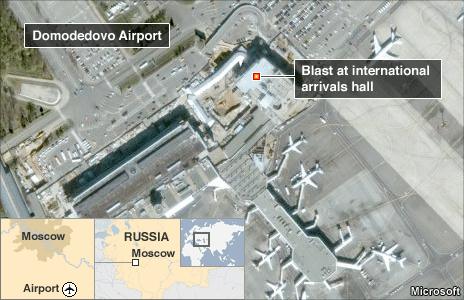Moscow bombing: Carnage at Russia's Domodedovo airport
- Published
CCTV footage shows the blast as passengers walked through the airport
A bomb attack at Moscow's Domodedovo airport has killed at least 35 people and injured more than 100 - many of them critically, officials say.
Investigators say the explosion, which happened in the arrivals hall, was caused by a suicide bomber.
President Dmitry Medvedev vowed that those behind the attack would be tracked down and punished.
He ordered increased security across Russia's capital, its airports and other transport hubs.
Mr Medvedev also called an emergency meeting with officials and also postponed his planned departure for this week's World Economic Forum at Davos.
The airport - the busiest serving Russia's capital - is 40km (25 miles) south-east of the city centre.
Russian investigators said two Britons were among the dead.
Footage from mobile phones showed the arrivals area filled with smoke, with bodies strewn across the floor, shortly after the attack around 1630 (1330 GMT).BBC security correspondent Gordon Corera said immediate suspicion about Monday's attack would fall on militants from the Caucasus region.
Militant groups fighting in the Caucasus know how important the perception that the president and prime minister provide a secure society is, and to undermine that is a key aspect of their aims, adds our correspondent.
Last March the Russian capital's underground system was rocked by two female suicide bombers from Russia's volatile Dagestan region, who detonated their explosives on the busy metro system during rush hour, killing 40 people and injuring more than 80.
Austrian traveller Dr Johann Hammerer: "Injured people were lying on trolleys"
'Almighty explosion'
Airport spokeswoman Yelena Galanova told Interfax news agency that the explosion occurred in the international arrivals hall in a public area "to which people who are not passengers have free access".
The hall was packed as several international flights - including one from the UK - had just landed. The device is thought to have contained the equivalent of 7kg (15lb) of TNT.
According to eyewitnesses quoted by Russian TV's Vesti news programme, before detonating the explosives the bomber shouted: "I'll kill you all!"
Briton Mark Green, who was on a British Airways flight that landed at the airport before the explosion, told BBC News there were thousands of people in the baggage collection area, baggage hall and queue for immigration at the time of the blast.
"We were walking out through the exit of the arrivals hall towards the car, and there was this almighty explosion, a huge bang... my colleague and I looked at each other and said 'Christ that sounds like a car bomb or something', because the noise was, literally, it shook you," Mr Green told BBC News.
He described scenes of panic and how he gave a drink of water to a bloodied Russian man whose face was blackened with soot.
Witness Artyom Zhilenkov, 30, told Reuters news agency that some of the victims were taxi drivers lined up in the arrivals hall waiting for fares.
Thick drops of blood and pieces of shrapnel were scattered across the snow-covered tarmac outside the hall, Interfax news agency reported.
In the aftermath of the explosion, Mr Medvedev told Russian state television a commission of inquiry would be established "to conduct urgent on-the-spot investigations".
He said: "After previous similar events, we passed appropriate legislation, and we have to check how it has been applied. Because obviously there have been lapses, and we have to get to the bottom of this."
A spokesman for Russian Prime Minister Vladimir Putin told the BBC's Newshour programme that no government could protect all of its citizens from attack all the time.
"(The) government is taking all (the) necessary measures," said Dmitri Peskov.
"But the nature of terror is that none of us, none of the countries in this world, are free from this threat. None of us could ensure 100% security level."
Police are hunting for three suspects in connection with the bombing, Russian media report.
All flights from Domodedovo have been suspended since the blast, while incoming flights are being diverted to Moscow's Sheremetevo airport.
US President Barack Obama condemned what he called an "outrageous act of terrorism", while Nato sent a message of solidarity to Russia's government.
European Council President Herman Van Rompuy called for those behind the attack to be punished, and British Prime Minister David Cameron telephoned Russian President Medvedev to offer his condolences and support.
"We should never allow the terrorists to win," said Mr Cameron.

- Published25 January 2011
- Published24 January 2011